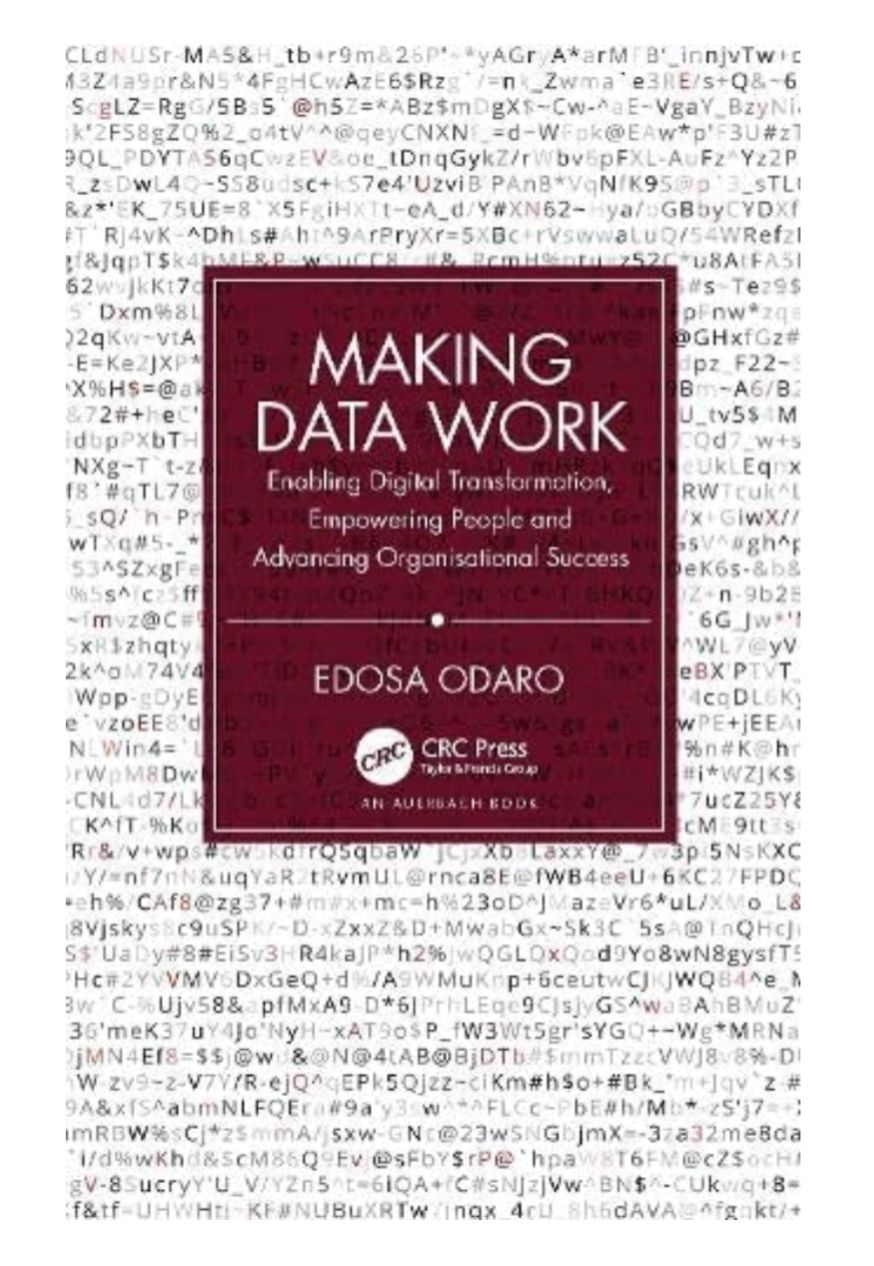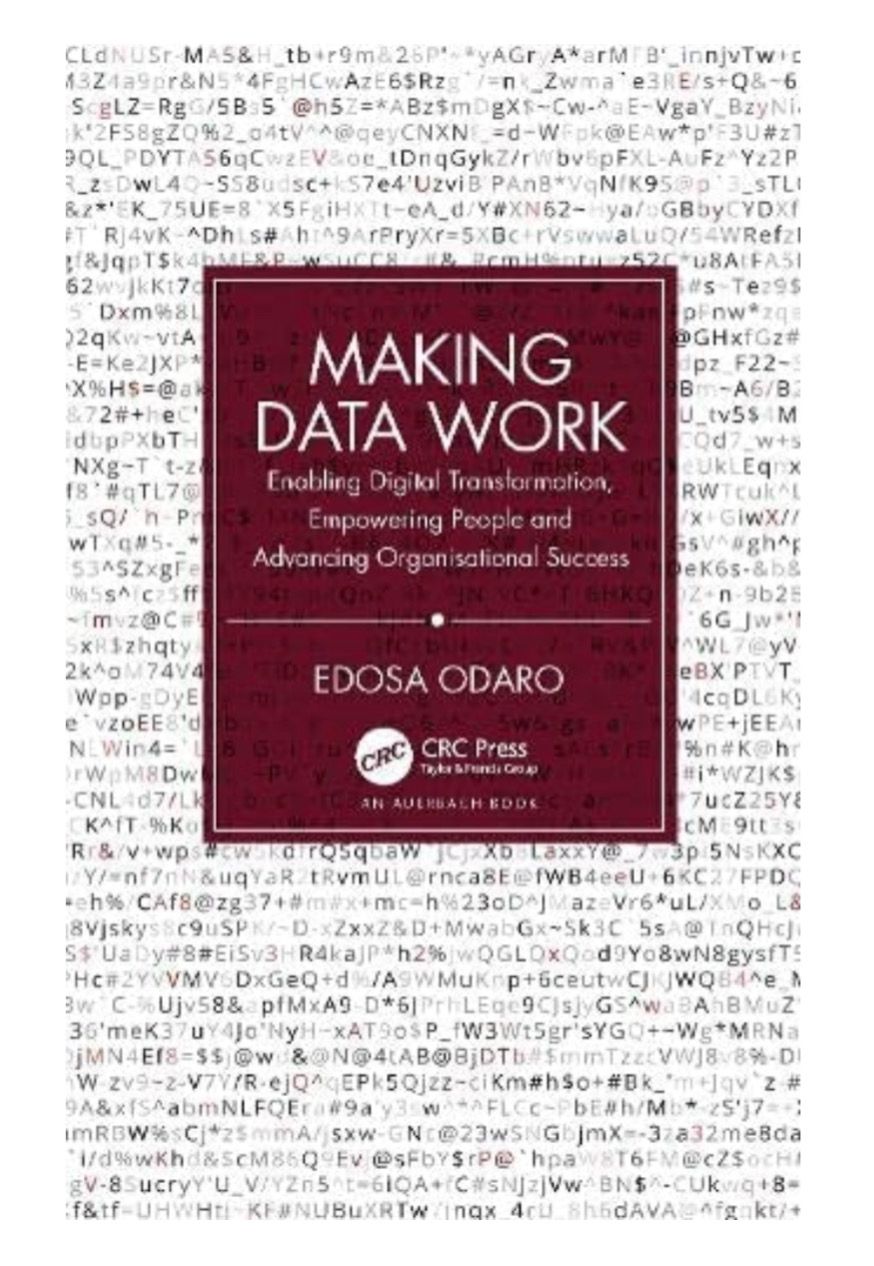Making Data Work

Book Summary
A retail giant already struggling due to the Covid-19 pandemic was faced with a disastrous situation when - at the end of a critical investment in an artificial intelligence project that had been meant to save money - it suddenly discovered that its implementation was likely to leave it worse off. An entire critical service stream within an insurer’s production system crashed. This critical failure resulted in the detentions of fully insured motorists for allegedly not carrying required insurance.
Making Data Work - Enabling Digital Transformation, Empowering People and Advancing Organisational Success - details these two scenarios as well as others illustrating the consequences that arise when organizations do not know how to make data work properly. It is a journey to determine what to do to "make data work" for ourselves and for our organisations. It is a journey to discover how to bring it all together so organisations can enable digital transformation, empower people, and advance organisational success. It is the journey to a world where data and technology finally live up to the hype and deliver better human outcomes, where artificial intelligence can move us from reacting to situations to predicting future occurrences and enabling desirable possibilities.
Back Cover Reviews
In this book, Edosa explores common challenges which limit the value that organisations can get from data. What makes his book unique is that he also tackles one of the unspoken barriers to data adoption―fear. Fear of the unknown, fear of the intangible, fear of the investment needed and, yes, fear of losing your job to a machine. With his talent for distilling clarity from complexity, Edosa tackles this and many other challenges. ―Tim Carmichael, Chief Data Officer, Chalhoub Group
This book offers fresh insight about how to solve the interactional frictions that hamper the flow of data, information and knowledge across organisations. Yet, rather than being stuck with endless polarising debates such as breaking down silos, it shifts focus back towards the ultimate "to what end." ―Jacky Wright, Chief Digital Officer (CDO), Microsoft US
If you care about AI transformation, empowering people or advancing organisational success in an increasingly digital world, then you should read this book.―Yomi Ibosiola, Chief Data and Analytics Officer, Union Bank

Making Data Work
Enabling Digital Transformation, Empowering People and Advancing Organisational Success
Introduction
In terms of data processing capacity, it is hard to imagine a system as complex, capable and efficient as the human brain, where synaptic connections allow us to tap into a vast depository of thoughts, decisions and memories – both lived and learned – to arrive at insights that may be personal and universally applicable at the same time.
It is fitting that one such memory – which represents a starting point in my quest to look at the interplay of technological and environmental factors in data transformation – should serve to connect my professional life to my place of origin.
My recollection of that long-ago moment is still vivid. I can smell the sweet aroma of suya, a uniquely spiced, lean-yet-succulent beef dish, cooked on an open coal barbecue. Miles away from the vendor handing me the satisfying snack, the smell lingers in the car that is taking me to Lagos International Airport, from where my flight to London will depart shortly.
The sated feeling from the meal wears off as traffic slows to a crawl and eventually comes to a complete standstill. As the driver navigates through Marina, the city’s financial district, I see the usual hawkers trying to take advantage of the gridlock to tout their wares. Even a sudden torrential downpour doesn’t dampen their persistence. Just ahead of us, there is a woman with a baby tied to her back and a pyramid of tomatoes balanced on her head, who narrowly escapes being knocked over by one of the notorious motorcycle taxis – locally called Okada – that often zip through the razor-thin spaces between cars.
As I contemplate the vibrant surroundings to take my mind off the worry about missing my flight, a radio announcement disrupts my thoughts.
News just coming through to us from the Reuters news agency: The top U.S. investment bank – Lehman Brothers – has just filed for bankruptcy protection.
I lean forward in my seat, contemplating the impact of this historic event, which would later become known as the trigger of the Great Recession.
It fuels my impatience to get back to London and immerse myself in a milieu that promises close engagement with this inflection point, yet I cannot help but wonder what repercussions may be in store for the people who populate the colourful scene around me and who, for the most part, are still oblivious to that ripple on the other end of the world that would turn into a tsunami affecting financial systems globally.
In the aftermath of the taxi ride, which brought me to the plane in time due to a sudden shift in the flow of traffic, I was thrust into the centre of efforts to mitigate the crisis.
Data, it was felt, would provide the answer. Data would not only point the way out of the current predicament but inform better means for protection going forward.
As I progressed along a career path centred on data transformation, I again and again encountered the belief that data – and the technology enabling it – were key to solving a range of challenges in widely diverse fields and circumstances. Fast-forward to today when, in spite of the peak of the coronavirus pandemic being far behind us, organisations are still dealing with its outfalls which forced a wholesale shift towards digital engagement and remote working, again relying on technology and digital data infrastructures.
Data landscapes are complex. They are influenced by a large number of factors – and not all of them are technologically in nature. I learned that an overly narrow view of the situation – one that doesn’t take external factors into account – will likely lead to a dead end that doesn’t yield viable solutions or perhaps brings answers that only work in the short term.
Drawing on examples from my extensive experience gained in the intervening years, I felt compelled to share insights on what works and what doesn’t – rooted in concrete situations.
One scenario at an insurance company, for example, culminated in a 3:30 call on a Saturday morning. I picked up to find myself confronted with a nightmare situation. As a recently appointed head of data, I was informed that an entire critical service stream in our production systems had crashed. This critical issue meant that the central motor insurance database relied upon by law enforcement agencies had not been updated. Shock turned to horror when I found that these failures had led to legitimate customers – who had recently bought car insurance policies from us – being detained by the police. Due to our service failure, the authorities had found no record of valid insurance policies in the database for the cars they were driving. Investigations later revealed that avoidable information gaps across support teams and systems were at the root of the mayhem – and had rendered team members powerless to avoid catastrophe.
As I contemplated this ordeal in the days and the weeks that followed, it became clear that this was no isolated incident. In fact, it was reminiscent of patterns I had seen recur through my interactions with over twenty household brands over the years.
In one scenario, a retail giant already struggling due to the Covid-19 pandemic was faced with the disastrous situation when – at the end of a critical investment in an artificial intelligence project that had been meant to save money – it suddenly discovered that its implementation was likely to leave it worse off.
In another scenario very early in my career, I saw a well-planned data and insurance service migration come to a dramatic failure on the Easter weekend it was supposed to be delivered to customers.
In yet another case, I witnessed the significant pressure of a very high profile multilateral project fail to deliver its globally and publicly committed outcome.
And another situation saw an exceptionally innovative firm struggling to keep up with its customer growth and almost coming to its knees.
Perhaps the most spectacular of these examples was the implication of such unfortunate failures I witnessed at the point when the financial giant, Lehman Brothers, tipped the entire global financial industry into chaos.
Making Data Work is an attempt to understand what lies beneath this recurring pattern – and what the incredible potential that data, artificial intelligence and advanced technological developments can contribute to the success of organisations. It is also an opportunity to explore factors that seem to hamper the efforts of otherwise incredibly capable individuals and organizations.
Beyond the exploration of such ubiquitous challenges, this book draws on my experiences over the past two decades and exposes the approaches that have worked – and those that have not. It reveals battles between stakeholder camps and between technology factions. It considered the implications of silos, in terms of data and technology but also in terms of people and organisations. It considered the perspectives of the hold-firm camps who seem extremely cautious and who espouse the benefits of maintaining the status quo. It also interrogates the viewpoints of the demolish-all camps who seem razor-focused on outcomes and embrace the ideology of a ‘results at all cost’ mindset underpinned by radical increases in the speed of change.
While both sides present some strong and valid positions – they seem to represent an impossible coexistence.
This book is a journey to determine what to do to “make data work” for ourselves and for our organisations. And as there are unmistakably strong benefits on both sides of the coin, it is a journey to discover how to “bring it all together.” It is not only packed with case studies on what approaches do not work but also provides actionable solutions that have delivered desirable outcomes.
Beyond observed hostilities and skirmishes among determined factions and unyielding camps, it is clear that the world wants much more – that we want much more. We want a world where data and technology finally lives up to the hype and delivers better human outcomes, where artificial intelligence can move us from reacting to certain situations to predicting future scenarios and possibilities. We want a world that enables positive implications for our health, for our climate and for our financial wellbeing – one that could go even further to leverage the combined effects of predictive artificial intelligence and prescriptive intelligent interventions to create a world where most distressing accidents and losses could be avoided altogether.
Yet over the years, we seem to have become sufficiently accepting of the status quo, and of the less than optimal outcomes it delivers. Such understandable complacency enables most of us to leave the most challenging of conundrums unanswered while we move onto other things.
This book comes out of my refusal to simply accept the status quo.

Making Data Work
Enabling Digital Transformation, Empowering People and Advancing Organisational Success
